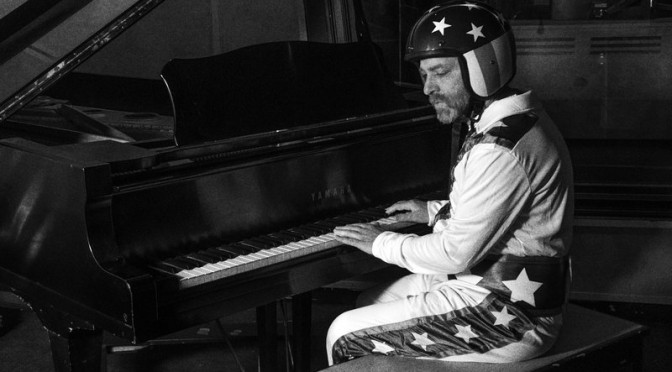I’ve previously touched the topic of musical talent in my discussion about the young Jacob Collier. I recently came across a sort of opposite case in terms of musical talent. H. Jon Benjamin is an American voice actor and comedian who’s got into the music world from the “wrong end”, so to say. He has a record deal and brought out his first album before he actually learned to play [Junkee].
As always I’d urge you to listen for yourself before reading on to make up your own mind about Benjamin’s undertaking.
First, let me say that I haven’t heard the whole record, just the clips available online, which I’ve included here as well. Frankly, I’m not sure if I could endure listening to the whole album 😉 But I do think these clips give a pretty good idea of the nature of Benjamin’s project.
Benjamin’s Jazz Daredevil raises many questions and thoughts of the nature of jazz as a musical genre but in a more general level also about what the philosopher Pierre Bourdieu has called “cultural capital”. More specifically, it challenges the notions of skills and talent required to perform music we call jazz and raises questions as to where lies the value of artistic enterprises in general and in jazz in particular.
Music as language
I’d like to here approach these questions through the common comparison between music and language. I’ll leave a more thorough discussion of this comparison for later and pick out a few themes from the music-as-language discourse that apply to the present discussion.
As discussed here before, jazz can – at least be attempted to – be defined by naming some essential characteristics such as specific rhythmic (swing) and melodic (blues) “vocabulary”, if you will. To be able to play jazz, then, would entail a command of these vocabularies in a way that others familiar with this musical language understand “what you’re saying”.
|
Music as language
|
The comments in the clip above by some of the musicians involved in Benjamin’s project suggest that they didn’t feel like they were exactly “speaking the same language” musically. In the clip it’s also suggested that Benjamin’s album is what jazz sounds like to the uninitiated. Some online commentators [NPR] also share this view.
Cultural capital
The narrator of the clip has a view in between the above two hearing Benjamin’s efforts as “fresh” approach to jazz. This, in my view, speaks of one of the biggest problems with some avant-garde art, it’s view of artistic novelty as cultural capital; trying to do something “new”, something nobody has done before as the main value of their art.
The underlying ideal of this aspiration to constantly reinvent the western musical tradition comes from one of the backbones of modernism, progressivism; the idea that the human condition is on a linear, constantly improving path (for the history of this line of thinking see here [Stanford Encyclopedia of Philosophy]).
In musical avant-garde this first took the forms of expanding the conventional parameters of music, mainly harmony, in musical impressionism and eventually attempting to do away with them entirely in expressionism. The latter also began experimenting with instrumentation such as the Italian musical Futurism of the early 20th century.
The group Performa discussing and performing parts of Luigi Rulloso’s Art of Noises.
While Benjamin undoubtedly was not particularly inspired by the pioneers of “Art of Noises”, the musical programme of the Futurists did include avoiding conventional musical training in favour of auto-didactic learning. However, both share the aim of creating something “new” and unconventional by setting themselves consciously apart from the “mainstream”.
loopool reading Russolo’s manifesto and providing some context to it 100 years after.
Unorthodox musicians are of course not a new phenomenon in jazz. Already in 1950s Ornette Coleman stirred the scene with his plastic saxophone and was told “You can’t play that” (Charlie Haden in the BBC documentary). However, Coleman found other musicians who shared his musical vision – or they found him – such as Charlie Haden and went on to “rewrite the language of jazz” with his playing that was rhythmically and harmonically “out of the box”.
Blues Connotation is one of Coleman’s classics revealing his rootedness in the Black American musical tradition and showing how he springs from it.
A quick listening experiment, however, reveals – even to the uninitiated, I believe – how Coleman is in fact very well at home in the musical language of jazz – or black music in general – and chooses to make his own version of it. Benjamin, on the other hand, seems to have a very rudimentary idea of how to “speak the jazz language”. Some of his rhythms and melodic shapes suggest that he’s not completely at loss in his musical environment, but in absence of any technical command of his instrument of choice or any knowledge of the “grammar” of the language he’s trying to convers in, his playing does sound quite as random as it actually is.
To say that this is how jazz sounds like to people who don’t know it says more about how people listen to music than about anything else. You don’t need to know a language to be able to tell when someone’s faking it. You just need to listen a bit more carefully and compare to something you know to be the “real thing”. In Benjamin’s case it’s actually quite easy if you listen to the exchanges – or dialogue, if you will – between the saxophonist and Benjamin.
In terms of cultural capital, I think the value of Benjamin’s project lies elsewhere than in its musical merits. As one of the online commentators mentioned this could be an “Andy Kauffman/Borat kind of ‘meta-gag’”. Benjamin himself is not admitting it, but then again that would spoil the gag, wouldn’t it?
It’ll be, however, interesting to see what comes of this if Benjamin actually pursues with his musical career as he says in the interview. Although jazz is no longer in the centre of Black American culture like it was in Coleman’s early days – or it’s even considered “dead” by some – high jacking it for such a “meta-gag” could be seen as controversial in perhaps a broader sense than Benjamin thought of. Him actually learning the language and then finding his way to speak it would bridge that gap. But whether that’s his end game with this project we’ll have to wait and see what his “untapped un-talent” brings us.




